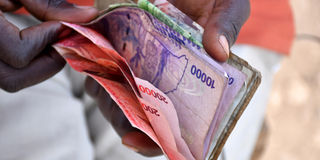Grow your money in an economic downturn

A man counts money. Now that the economy has reopened, understand what sectors are now crucial for the economy because Covid-19 highlighted the sectors that made money. PHOTO/EDGAR R. BATTE
What you need to know:
Saving creates safety in uncertain times. Rather than simply hope things will get better, you should act to improve your operations and position yourself for growth as the economy recovers, Racheal Nabisubi writes.
If there is anything Covid -19 pandemic has taught us is to save for hard times. The lessons learnt have taught many to create opportunities not only for innovative entrepreneurs but on an individual level.
Saving creates safety in uncertain times. Rather than simply hope things will get better, you should act to improve your operations and position yourself for growth as the economy recovers. a
Despite having difficult environments, they (economic environment) can also coincide with great opportunities. This means you have to remain vigilant in monitoring the market landscape for opportunities to pick up high-quality assets at discounted prices.
Several times, businesses exposed to the impacts of an economic downturn will first experience changes in their trading activity which will in turn be reflected in the sales and revenue.
However, financial analysts believe it is possible to turn around and manage your finances once again during an economic downturn by strengthening your financial position, and ensuring your business is ready to embrace opportunities.
Mr Martin Nsubuga, the chief executive officer at Uganda Retirement Benefits Regulatory Authority (URBRA), observes that government securities and selected equities like telecoms and banks performed well despite the economic downturn.
Asset classes
He cites an example at a sector level, the retirement benefits sector registered tremendous growth during the pandemic; it grew to over Shs18 trillion in value.
“That growth is largely informed by the asset classes that the schemes invested in. The most outstanding asset class is government securities which account for almost 75 percent of Assets Under Management (worth about Shs18.5trillion). The government securities are in Uganda, Kenya and Tanzania,” Mr Nsubuga says.
In government securities, returns are fixed long term.
A government security bought today has a fixed income until the maturity of that instrument.
For instance, if it is a five-year instrument, it will give me fixed income for five years.
“In principle, I am assured of an income that is very attractive for five years ahead. That is a good strategic move in terms of investment,” he says, adding that in the pensions/retirement benefits market, government securities also have a high headroom such as a scheme can invest up to 80 percent of their portfolio in that asset class, which also makes it a good investment option.
Thriving to make money grow
However, there are other equities that continued to thrive despite the Covid-19 pandemic.
“We had telecom equity. Safaricom which holds the largest share of all the equity in the market. Equity bank, KCB…all Kenyan equities did well,” he explains.
He further adds that the telecom and the financial sector (banks) continued to make earnings for their clients and hence they were able to provide income to the members.
It can be argued that those two asset classes like quoted equities and government securities have played a significant role in the recent growth of the retirement benefits sector.
Resilient sectors
On the other hand, some sectors did not do well, for instance, education and hospitality sectors. These sectors were impacted by restrictions in movement.
Mr Nsubuga says: “Therefore, investment in such assets were affected by the recent downturn. Employees in such sectors were not able to make their regular retirement saving contributions. That impact was also felt in the retirement benefits sector.
Mr Tony Otoa Okao, chief executive, Stanbic Business Incubator, says the economy is open which means that people just have to go back to doing what they do best. The best thing is to understand what sectors are now crucial for the economy because Covid highlighted the sectors that we had ignored and never put key interest in but these are sectors that have made money.
“As an entrepreneur, you will be looking out for these several sectors which never stopped like construction, agriculture and health among others. It is also a great opportunity to look at sectors that are going to be in need of massive support such as education which has been closed for a long time,” Mr Otoa says.
Now they are back and running and many children are back at school. So you can supply to schools goods and services and offer transportation.
He explains: “Some of these sectors were closed for almost two years but now they are up and running and in need of services. This will be a great opportunity to make money. The world seems to be back to normal. Everyone is spending and enjoying themselves; the habit of saving for bad times has ceased. This means that we forget quickly,” Mr Otoa says.
In the first weeks after the lockdown, most programmes were about how important it is to save.
He, however, notes that today, most people are back to ‘default settings’ where people are low on saving.
“We are asking ourselves whether we have learnt some lessons on personal finance because in personal finance, saving is very crucial. And what you use your savings for and where or how you invest that money are very critical areas.”




